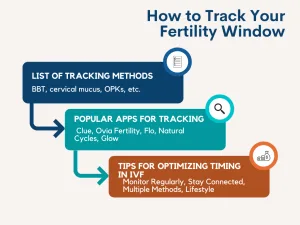Fertility Timing | Why Waqt Ka Khayal is Crucial for IVF Success
Egg Freezing, Fertility
When it comes to conceiving, especially with IVF, one of the biggest game-changers is timing—yes, waqt ka bada khayal rakho! Whether you’re trying to conceive naturally or with the help of fertility treatments like IVF, understanding and tracking your fertility window can make all the difference. Let’s chat about why this timing matters so much, and how you can track it effectively to boost your chances of success.
What is the Fertility Window?
In simple terms, the fertility window is the best time in your menstrual cycle when conception is most likely to happen. It’s usually the 5-6 days leading up to and including ovulation—when your body releases an egg ready to be fertilized. But here’s where the science kicks in: for IVF, the alignment of the egg retrieval, fertilization, and embryo transfer must sync perfectly with your natural cycle. That’s why “ek ek din” can make a huge difference in IVF success.
The Science Behind the Fertility Window | Ovulation Tracking
You may have heard of ovulation, but did you know that it’s the star player in the fertility window? Ovulation is when your ovary releases an egg, and this egg lives for about 12-24 hours. The days leading up to this event are your prime fertility window. With IVF, it’s critical to know when this happens so doctors can plan egg retrieval and embryo transfer at the perfect time.
How to Track Your Fertility Window?

Now that we know the fertility window is important, kaise track karein? There are multiple ways to monitor it and some are easier than you think!
- Basal Body Temperature (BBT) Charting: Track your body temperature every morning. A slight rise in BBT can indicate ovulation.
- Cervical Mucus Monitoring: The consistency of your cervical mucus changes throughout your cycle. When it’s clear and stretchy (like egg whites!), that’s your most fertile time.
- Ovulation Predictor Kits (OPKs): These are simple pee sticks that detect the hormone surge just before ovulation.
- Ultrasound Monitoring & Blood Tests: For those going through IVF, regular ultrasounds and blood tests help doctors pinpoint the best time for egg retrieval and transfer.
Tools and Apps to Help You Track
If keeping track manually feels too much, don’t worry—there’s an app for everything aajkal! Here are some popular fertility tracking apps:
Some of these apps even allow you to share data with your fertility specialist, making it easier to personalize your IVF treatment and optimize timing.

Timing in IVF Success
When it comes to IVF, timing is everything. From egg retrieval to embryo transfer, every step needs to align with your cycle to maximize success. Doctors use hormone medications to control and track the cycle closely, but understanding your own fertility window adds to the accuracy.
Tips for Optimizing Timing in IVF
- Monitor Regularly: Consistently track ovulation signs at home and through your clinic’s monitoring methods.
- Stay Connected: Always keep an open line of communication with your fertility specialist. They’ll help adjust treatment based on your cycle.
- Multiple Methods: Don’t rely on just one tracking method. Use BBT, cervical mucus, and OPKs to get a complete picture.
- Lifestyle: Don’t forget! A healthy lifestyle with balanced nutrition, sleep, and stress management can help regulate ovulation and improve IVF outcomes.
Misconceptions about the Fertility Window
Some people think ovulation always happens on Day 14—aisa zaroori nahi hai! Every woman’s cycle is different, and timing can vary.
What About Irregular Cycles?
If your cycles are irregular, tracking ovulation may seem challenging, but with the right tools and medical help, it’s possible!
Myth Busting on IVF Timing
Some think that because IVF involves medical intervention, timing isn’t that important—galat soch! Even with IVF, aligning your body’s natural cycle with treatment steps is key to success.
Fertility timing is the heart of conception, and even more so in IVF.
So, whether you’re tracking your fertility window or working with your doctor on IVF timing, remember that every day counts. Keep monitoring, stay in tune with your body, and book an appointment with your healthcare provider to make sure you’re on the right track!
Apna waqt, apni planning—sahi waqt pe success!
I hope this gives you clarity on why timing is so crucial in IVF. If you’re feeling a little confused or overwhelmed, don’t worry. We’re here to help! Book free consultation with Fertility Coach





Your Comment Is Valuable For Us
Thanks For Your Feedback.